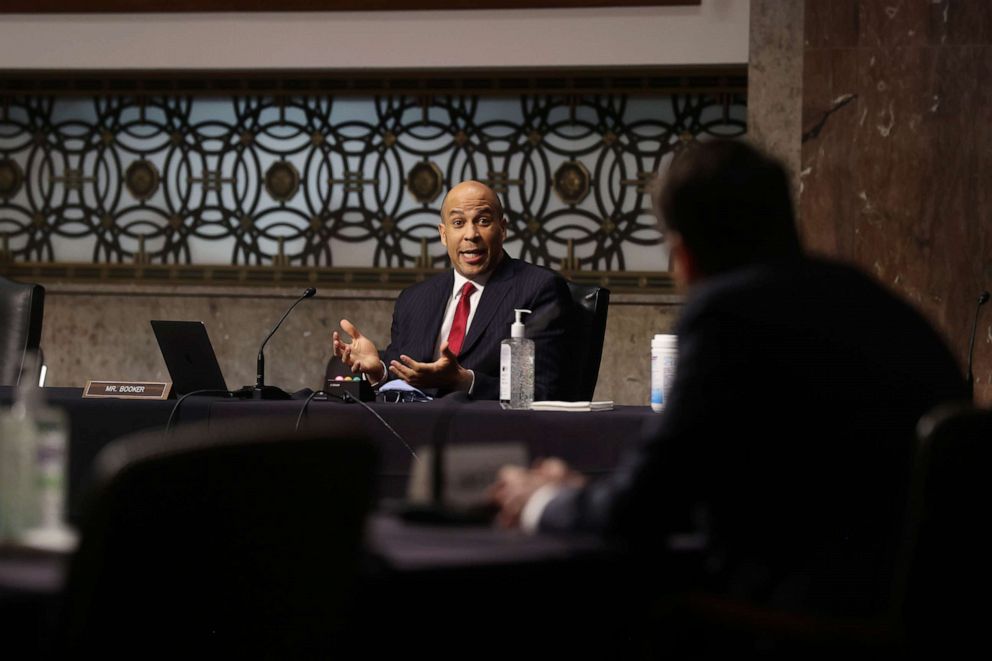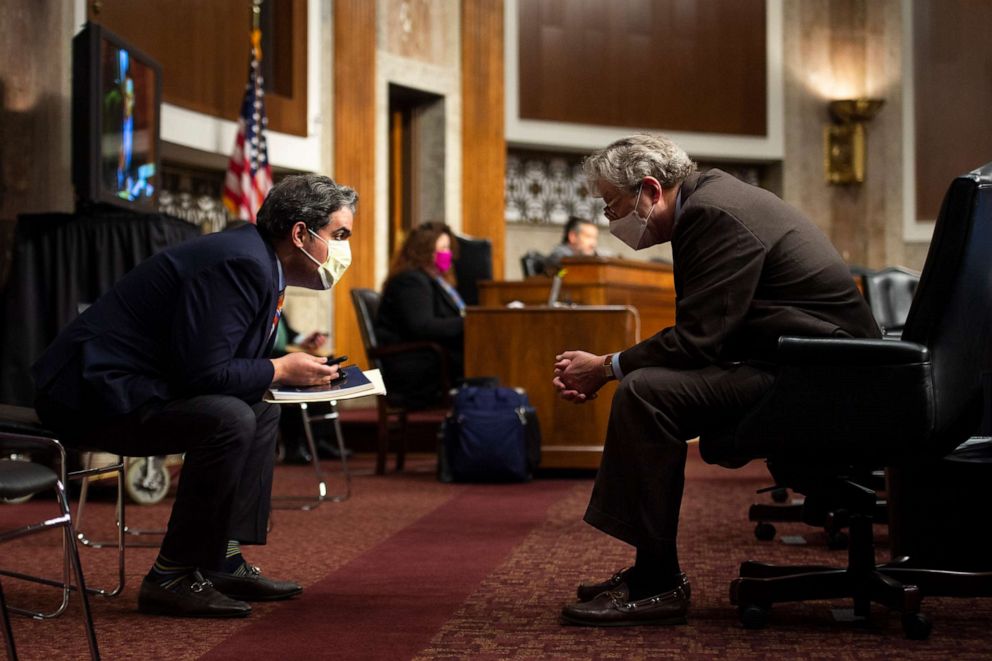Democrats decry hearing for Trump appeals court nominee amid pandemic
Judge Justin Walker, 37, is a protege of Senate Majority Leader Mitch McConnell.
Senate Democrats on Wednesday decried holding a confirmation hearing for a federal appeals court nominee close to Senate Majority Leader Mitch McConnell amid the coronavirus pandemic - the Judiciary Committee's first hearing since lawmakers returned to Washington this week.
“I thought if the Senate Judiciary Committee is coming back for business, there's certainly a lot of things we can bring up related to this COVID-19 crisis,” said Sen. Dick Durbin, an Illinois Democrat, pointing to the effect the virus is having on prisons, immigration, and spiraling fraud, particularly against seniors.
“Instead we’re considering the nomination of a 37-year old family friend of Senator McConnell’s, to the second highest court in the land, a nominee who has a record, ironically, of stridently opposing the Affordable Care Act, which seeks to extend health insurance coverage to more Americans - and who was last year found "unqualified" to serve as a district court judge,” referring to a rating the American Bar Association gave Justin Walker.

Tune into ABC at 1 p.m. ET and ABC News Live at 4 p.m. ET every weekday for special coverage of the novel coronavirus with the full ABC News team, including the latest news, context and analysis.
Durbin also said holding the hearing now was pointless because Judge Walker, if the Senate confirmed him for the appeals court, would not be able to take the seat until September. The man in the position now, Judge Thomas Griffith, is not set to retire until the first of that month.
Judiciary Committee Chairman Sen. Lindsey Graham R-S.C., was unswayed by the biting criticism, praising the nominee as “a highly qualified individual.” Graham did say that the panel would likely do more on COVID-19 in the months ahead, pointing to a hearing -- just scheduled for next week -- on litigation concerns amid the pandemic.
“I feel the committee has a lot to do related to the coronavirus and we will, but we also have a lot to do to fulfill vacancies on the courts,” Graham said.

Democrats blasted Judge Walker as an inexperienced, conservative ideologue and staunch opponent of the Affordable Care Act. In a 2018 op-ed, Walker railed against the Supreme Court decision upholding the Obama-era law as “indefensible.”
Walker testified Wednesday that then, before he was on the bench, he was merely “an academic and a citizen engaged in matters,” claiming that now, as a judge, he would follow the Supreme Court ruling upholding the law “fully and faithfully.”
“It’s indefensible that we’re here to confirm someone who would dismantle the health care law that is saving millions of lives,’’ said Sen. Richard Blumenthal, D-Conn.
When the panel’s top Democrat, Sen. Dianne Feinstein of California, asked, “Why in the middle of the pandemic should we support a nominee that would take away the health care of millions of Americans including those w/ preexisting conditions?” Walker pointed to his own personal life, repeatedly noting his compassion and empathy for those with serious health conditions.
“When I was two years old my mom had breast cancer. She’s a survivor,” recounted Walker who said his single mother struggled to support the family, adding, “I thank God every day she was able to get the medical care she needed.” But as a judge, Walker repeated, “It’s not my job to define policy. It’s my job to go where the law leads.”
Walker’s clerkship for Supreme Court Justice Brett Kavanaugh and his past vociferous defense of the judge - whom Democrats believe sexually assaulted a former high school classmate though he staunchly denied it - was a particular point of criticism.
In a speech in Louisville at his investiture in March, the judge said of his mentor, “In Brett Kavanaugh’s America, we will not surrender while you wage war on our work, or our cause, or our hope, or our dream.”

Judge Walker, who also repeatedly pointed to his other Supreme Court clerkship for former Justice Anthony Kennedy -- a hero to some Democrats -- as formative, did not back away from his friendship and admiration of the controversial Kavanaugh, saying he would defend both justices “until the cows come home.”
As for the speech, Judge Walker said, “I was, in my speech, saying that I am unabashedly as other judges have been - in my defense - for the rule of law, and of the approach to judging that considers text, rather than inserting a judge’s political opinions into what the law is.”
“I think Justice Kavanaugh’s approach to the law respects separation of powers. It respects the judge’s limited role in our Constitutional structure, and it demonstrates fidelity to the text and those were the kind of legal principles that I was praising when I was praising Justice Kavanaugh.”
Concerns about coronavirus permeated the nearly three-hour hearing Wednesday. Many Democrats participated via video conference, and those lawmakers who were present were socially-distanced in a larger hearing room at tables set up in a giant circle for maximum space. Some wore masks.
Sen. McConnell, as the hearing got underway, praised his former intern and family friend he has known since the Walker was eight years old.
"His reputation as a brilliant legal rising star precedes him," McConnell said in a Senate floor speech. "I’m confident my colleagues on the committee will find this candidate possesses a generational legal mind, a kind hard and total judicial impartiality."
But Democratic Leader Chuck Schumer shot back, "What Leader McConnell is doing to the courts is nothing short of disgraceful,” adding, "Every Republican who votes for this nominee, Mr. Walker, will be voting to dismantle the ACA, and take millions of people's health care away from them.”
"There are millions of newly unemployed Americans, but in the Senate the Republican is spending time giving jobs to right wing judges," continued Schumer, D-N.Y.
McConnell replied that "essential matters of government do not cease because of coronavirus...I want to assure (Democrats) that we'll need to continue to show up and cast votes. Government businesses will not go undone."
The American Bar Association found Walker to be “not qualified” last year when President Trump first nominated him for his current post on the district court in Kentucky owing to his lack of any trial experience, but the group dramatically shifted its rating on Tuesday to “well qualified” for the new lifetime appointment to the influential federal appeals court, saying its “consideration for court of appeals nominations is focused differently.”
The ABA said that it places a higher emphasis on writing rather than courtroom experience for appellate nominees.
Tuesday’s ABA statement said while federal judicial nominees “ordinarily should have at least 12 years’ experience in the practice of law, a majority of the Standing Committee concluded that Judge Walker’s varied accomplishments as a law clerk, law professor, and now as a district judge offset concerns about his years of practicing law.”
And while it’s unclear if the judge will ultimately be confirmed by the Senate, one thing is certain, the support of the powerful Republican leader is a major factor in his likely confirmation.
ABC's Allie Pecorin contributed to this story.
What to know about coronavirus:
- How it started and how to protect yourself: coronavirus explained
- What to do if you have symptoms: coronavirus symptoms
- Tracking the spread in the US and Worldwide: coronavirus map




